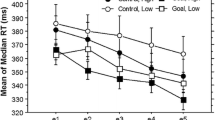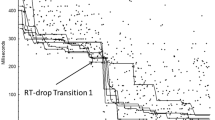Abstract.
Traditionally, implicit learning has been defined in terms of a lack of awareness of the process and products of learning. In the face of a number of conceptual and empirical difficulties with this definition, it has recently been suggested instead that the critical feature of implicit learning is that it proceeds without making any demands on attentional resources. As disconfirmatory evidence for this, we describe the results of two experiments which each used a sequential reaction time task. With a tone-counting secondary task, measures of sequence learning were significantly affected by whether training occurred under single- or dual-task conditions, regardless of whether testing took place under single- or dual-task conditions.
Similar content being viewed by others
Author information
Authors and Affiliations
Additional information
Electronic Publication
Rights and permissions
About this article
Cite this article
Shanks, D.R., Channon, S. Effects of a secondary task on "implicit" sequence learning: learning or performance?. Psychological Research 66, 99–109 (2002). https://doi.org/10.1007/s00426-001-0081-2
Received:
Accepted:
Issue Date:
DOI: https://doi.org/10.1007/s00426-001-0081-2




